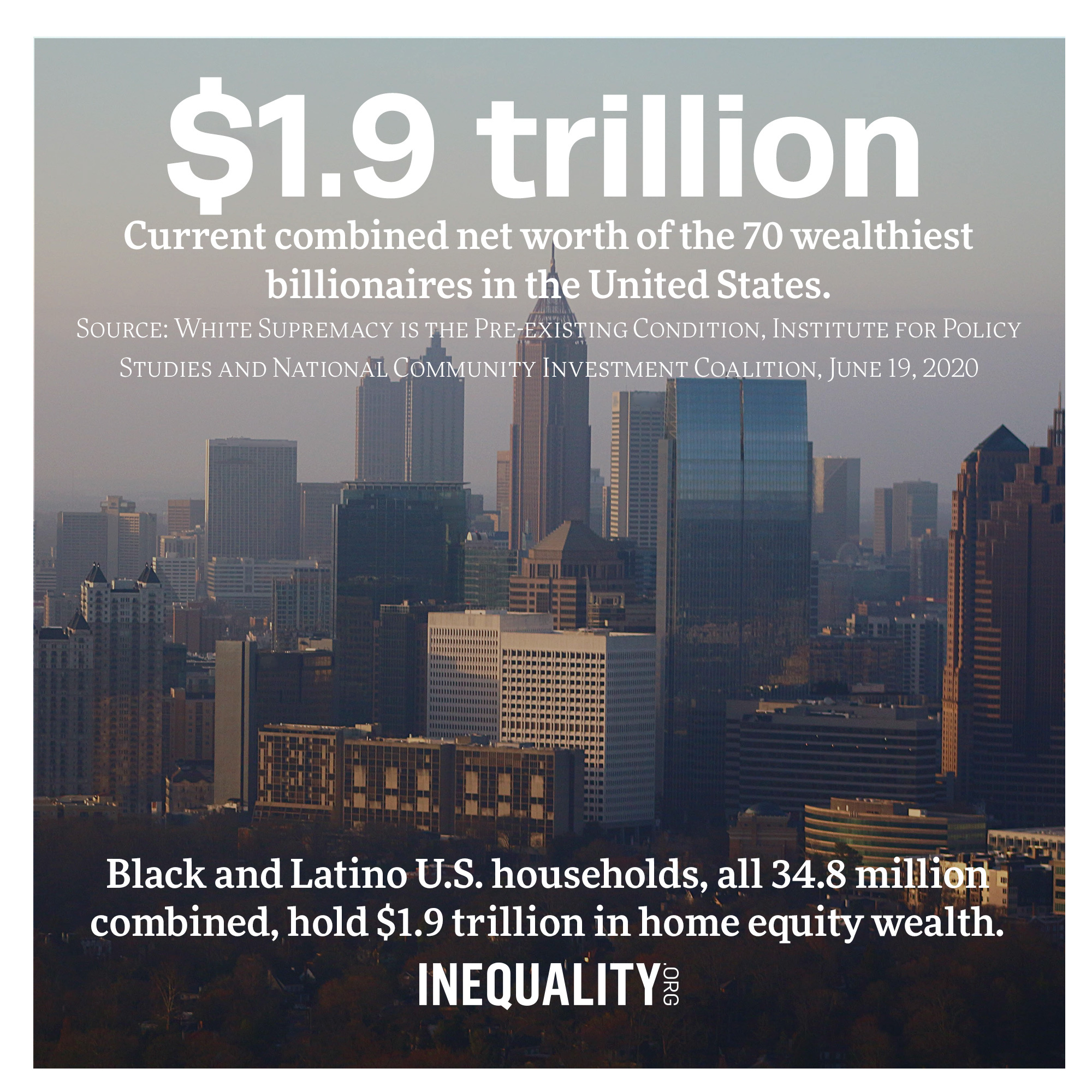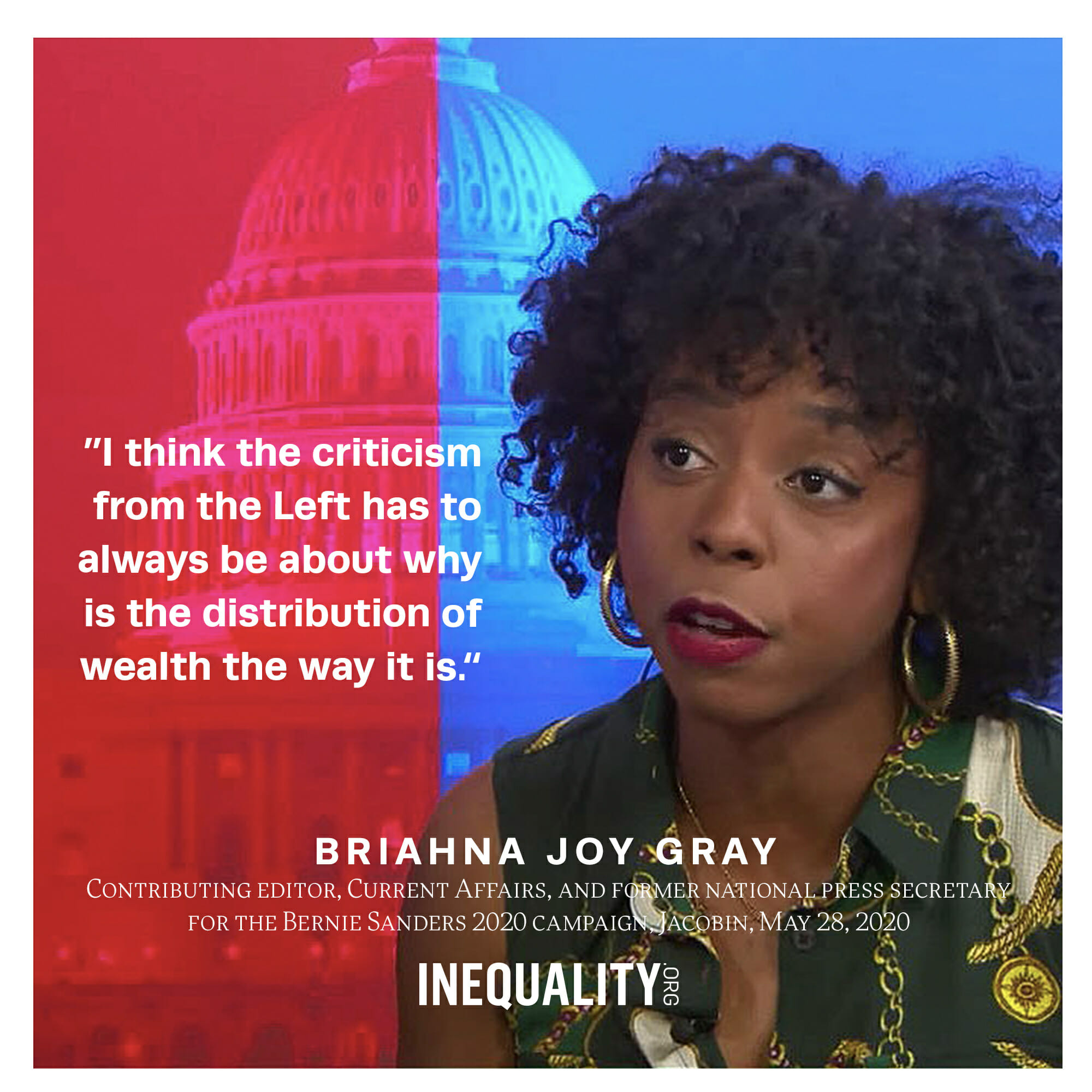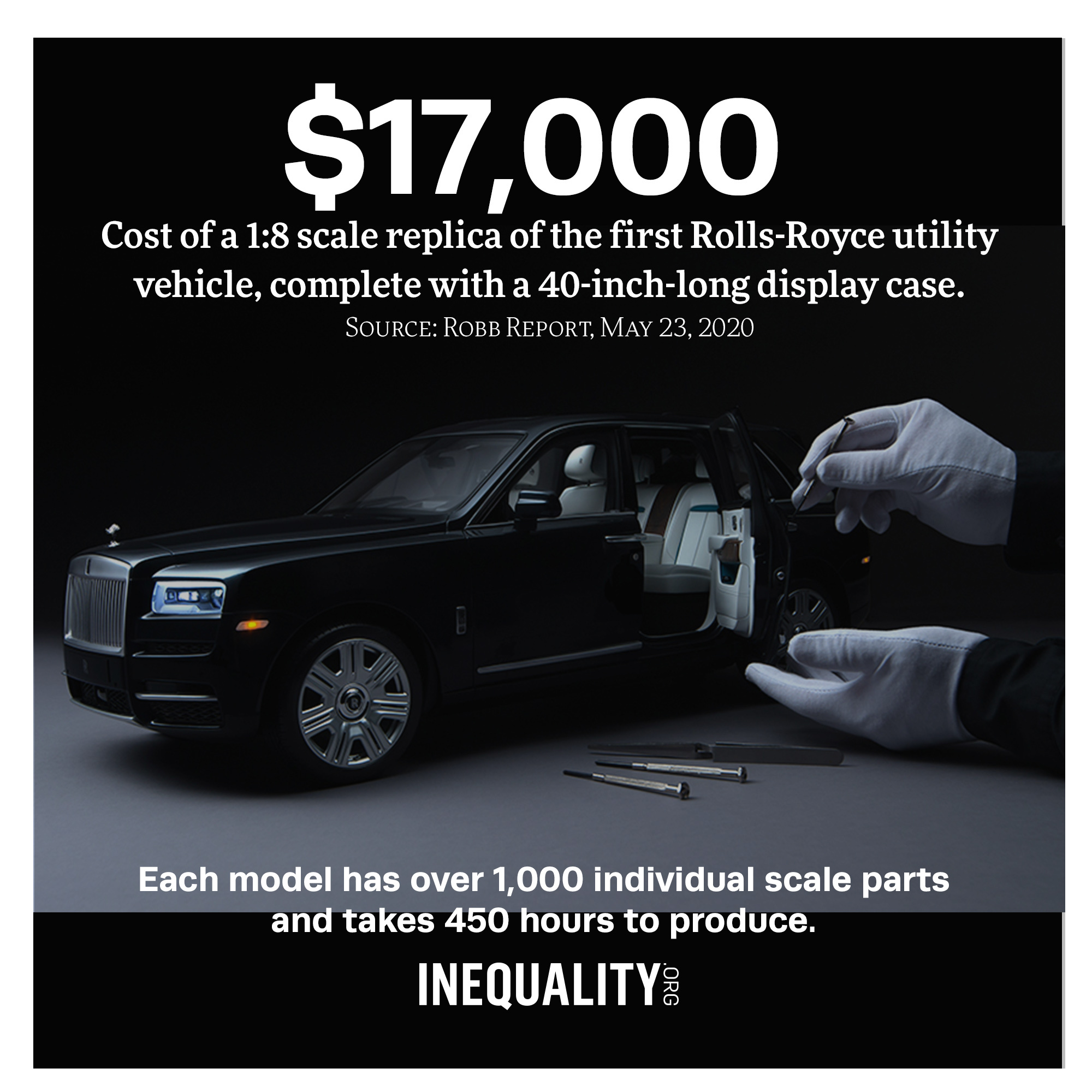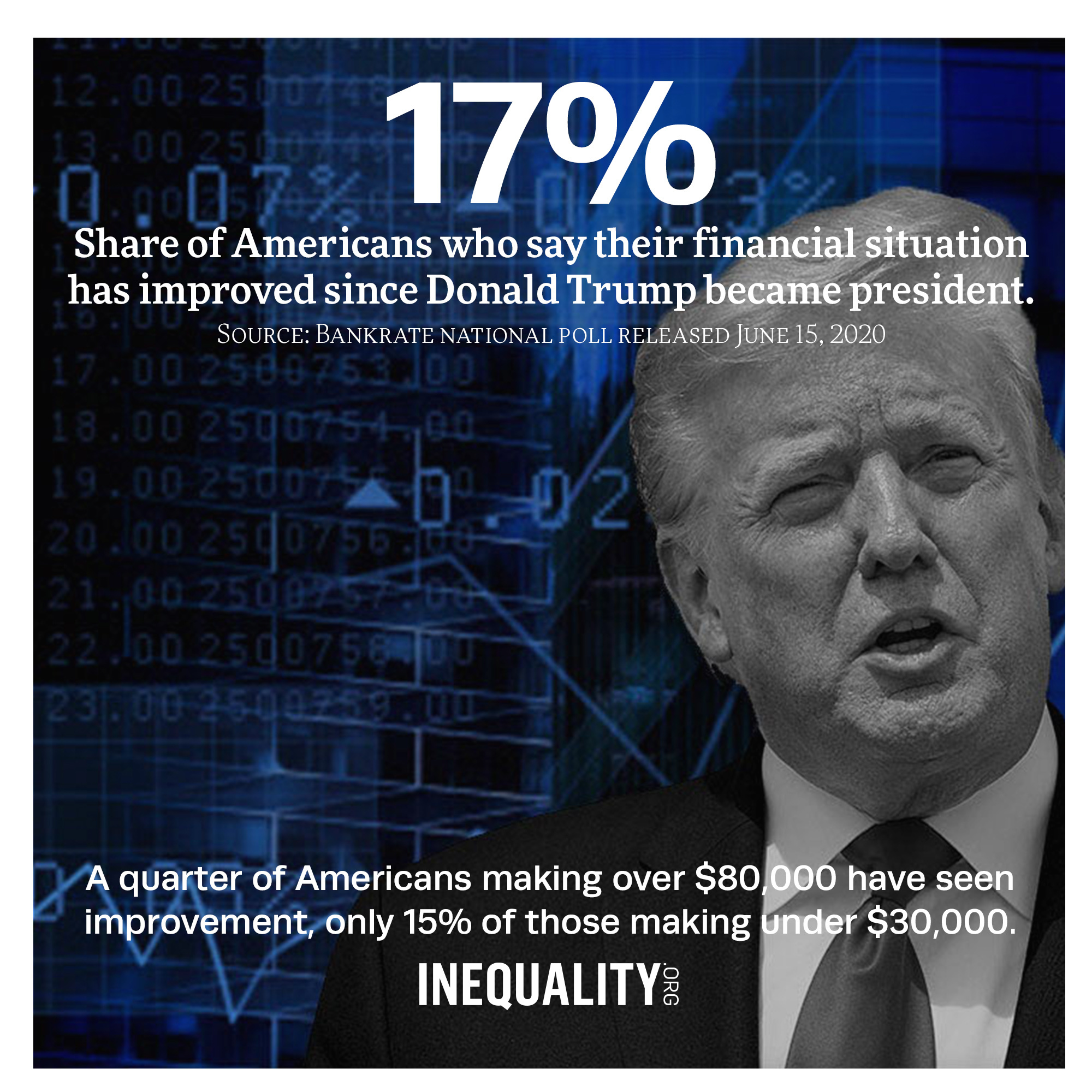| THIS WEEK |
Over the last several weeks, Black Lives Matter protesters have gathered in the streets to demand an end to police violence. The backdrop to those protests: the stark racial disparities of Covid-19. And behind that backdrop lies the racial wealth divide, the centuries of racial oppression so visible in the bank accounts and general welfare of Black and white Americans.
Our latest report, White Supremacy is the Pre-existing Condition, shows how dramatic this racial wealth divide has become — and how the pandemic has only supercharged it. In the 12 weeks since sheltering in place began, U.S. billionaire wealth has increased by over $637 billion, the equivalent of 13 percent of all the wealth held by the nation’s 41 million Black people.
One thing we know for certain, we’re going to need a powerful movement to push those changes. One source of inspiration is the more than 1 million people who gathered this past weekend for a digital rally organized by the Poor People's Campaign. See my colleague Sarah Anderson’s report on this inspiring event.
Chuck Collins, for the Institute for Policy Studies Inequality.org team
|
|
| |
|
| INEQUALITY BY THE NUMBERS |
 |
|
|
|
| |
|
| FACES ON THE FRONTLINES |
 |
| Black Immigrant Domestic Workers During Covid-19 |
| Leydis Muñoz’s hands smell of bleach these days. Muñoz, an Afro-Latina domestic worker in New York City, has been cleaning constantly for fear of contracting Covid-19. Her employer let her go as a nanny last year to avoid paying maternity leave. Now, thanks to fear of the virus, it’s a struggle to find work. Explains Muñoz: “If we don’t work, we don’t get paid. If we don’t get paid, we don’t eat or have any shelter for our family.” Black immigrant domestic workers like Muñoz are feeling three converging storms: the pandemic, the resulting recession, and structural racism. A new survey from the National Domestic Workers Alliance and the Institute for Policy Studies has more on the challenges they’re facing. |
|
| |
|
| WORDS OF WISDOM |
 |
|
|
|
| |
|
PETULANT PLUTOCRAT
OF THE WEEK |
 |
| For This Top Exec, Sacrificing (Others) Comes Easy |
| Life has been sweet for Samuel Hazen, the CEO at HCA Healthcare, the Nashville-based for-profit hospital chain. In 2019, Hazen pulled down $26.8 million in compensation. This year looked even better. But then the pandemic hit. HCA promptly cut salaries for 11,000 corporate staff, and even Hazen “sacrificed,” donating $237,000 of his salary — less than 1 percent of his total pay — to a worker relief fund. HCA nurses and other frontline workers, meanwhile, would sacrifice quite a bit more. Two lost their lives amid widespread staff complaints about a lack of adequate protective gear. Hazen’s HCA responded by denying any gear problems and threatening unionized nurses with layoffs if they didn’t give up scheduled pay increases and accept benefit cuts. The nurses didn’t cave. They demonstrated instead outside 15 HCA hospitals. Hazen’s reaction? HCA has established “a new line of business” that’s recruiting scab “replacement workers” to fill in should HCA nurses choose to strike.
|
|
| |
|
| BOLD SOLUTIONS |
 |
| What Would it Take to End the Racial Wealth Divide? |
|
What would it take to really eliminate the racial wealth divide, as part of a program to recover from the Covid-19 pandemic? First, we need to learn from the mistakes of the flawed recovery program to the 2008-2009 Great Recession that worsened that gap rather than diminished it. In our new IPS report, White Supremacy is the Pre-Existing Condition, we offer eight solutions to ensure that economic recovery reduces the racial wealth divide. These include delinking health insurance from employment, expanding homeownership, guaranteeing jobs and living wages, and establishing children’s savings programs for every child born in this country. The U.S. Postal Service, the report urges, should take on an expanded role and provide basic financial services to aid the “unbanked.” We also need a rigorous “racial wealth audit” for each new federal policy to ensure programs reduce racial wealth divisions, not make them worse.
|
|
| |
|
| GREED AT A GLANCE |
 |
|
|
|
| |
|
| TOO MUCH |
 |
| Grand Fortunes Past: Still Poisoning Our Present |
| The coronavirus just keeps coming — and so do the billions for America’s top billionaires. The nation’s five richest individuals have added a combined $101.7 billion to their net worth since the virus hit hard nationally in March. These five exceedingly affluent souls, notes the latest billionaire update from Americans for Tax Fairness and the Institute for Policy Studies, now hold a combined fortune worth nearly half a trillion dollars. How much damage will this colossal concentration of wealth and power eventually wreak upon us? We won’t know for quite some time. Grand private fortunes can do ill long past the passing of the kingpins who amass them. How long past? The reality we face here in 2020: If Donald Trump and his enablers keep power this November, they’ll owe their victory in no small part to one of the richest Americans alive — in 1920. Inequality.org co-editor Sam Pizzigati has more. |
|
|
|
| |
|
| MUST READS |
This week on Inequality.org
Dedrick Asante Muhammad, Darrick Hamilton, Chuck Collins, and Omar Ocampo, White Supremacy is the Pre-existing Condition. Eight solutions to ensure economic recovery reduces the racial wealth gap.
Sarah Anderson, Virtual Poor People’s Campaign Rally Draws Crowd of More Than a Million. Through personal testimonies of systemic racism, poverty and inequality, ecological devastation, and militarism, the event brought the campaign’s bold fusion agenda to new audiences.
Elsewhere on the Web
Alana Semuels, Segregation Has Gotten Worse, Not Better, and It's Fueling the Wealth Gap Between Black and White Americans, Time. Persistent housing segregation restricts access to good jobs and everything else that helps families accumulate wealth.
Janet Gornick and Nathaniel Johnson, Income Inequality in Rich Countries: Examining Changes in Economic Disparities, Social Science Research Council. A clear, accessible look at how some major developed nations have become much more unequal than others.
Eric Levitz, Corporate America Loves Increasing Racial Inequality, New York. Black lives matter. For Corporate America tax cuts matter more.
Reshma Kapadia, Why the Widening Wealth Gap Is Bad News for Everyone, Barron's. The one-two punch of the worst health crisis and economic downturn in decades has brought to the fore an issue that has been simmering for decades: America's increasing income and wealth disparity.
Kathryn McKinley, Eerily similar? Examining fates of the rich and poor during COVID-19 and 14th century Black Death pandemics, Genetic Literacy Project. The classic author Boccaccio helps us see how wealth and advantage can impair people’s abilities to empathize with the hardships of others.
Thomas Boswell, Don’t let MLB owners cry poor. They can afford to do what’s right for baseball, Washington Post. Baseball owners are bashing their game to maximize profits.
Ben Smith, Newsrooms Are in Revolt. The Bosses Are in Their Country Houses, New York Times. Inequality within the media is undermining coverage of the crises we face.
Robert Reich, Ignore the Corporate Outreach. CEOs Profit Off Racism — Just Like Trump, Newsweek. In Congress and statehouses, CEOs who condemn racism are grabbing giant tax cuts.
Scott Horsley, The Rich Have Stopped Spending and That Has Tanked the Economy, NPR. America’s economy has become too dependent on the whims of the wealthy.
David Brooks, How Moderates Failed Black America, New York Times. Better education is not leading to greater equality.
Yves Smith, How America’s Covid-19 Rescues Look Set to Increase Inequality, Naked Capitalism. In a system where most people must sell their labor to survive, the people in charge need to provide enough adequately paid work. The importance of that duty seems lost on America's elites.
Jomo Kwame Sundaram, Meritocracy Legitimizes, Deepens Inequality, Inter Press Service. Meritocrats like to see themselves as the antithesis of the old aristocratic elite, but their “meritocracy” increases social polarization.
Martin Kurzweil and Josh Wyner, Rich Kids Are Eating Up the Financial Aid Pot, New York Times. Higher ed dollars are going to “merit aid” for wealthy kids, part of a bidding war to enroll high-income students.
Mihai Andrei, What will the economy look like after the pandemic? Past crises suggest rising inequality, ZME Science. In our rush to restart the economy, we must not forget that leaving people behind can create even more trouble down the line.
Michael Stott, Latin America’s taxing problem, Financial Times. A colossal fall in regular tax revenues has eight nations in Latin America, the world's most unequal region, warming to the notion of wealth taxes. |
|
| |
|
| A FINAL FIGURE |
 |
|
|
|
| |
|
|